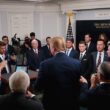A significant portion of the German population is deeply divided over whether a recount should be ordered for the recent Bundestag election following the razor-thin margin by which the “Bundnis Sahra Wagenknecht” (BSW) party narrowly failed to enter parliament. According to a recent poll conducted by the Insa opinion research institute and reported by the Redaktionsnetzwerk Deutschland, 36% of Germans support a recount, while 30% oppose it and 21% remain indifferent. Unsurprisingly, support for a recount is highest among BSW supporters (77%) and those aligned with the Alternative for Germany (AfD) party (60%).
The call for a recount stems from BSW’s contentious challenge to the election results. Sahra Wagenknecht, the party’s founder and outgoing chairwoman, has publicly criticized the Bundestag’s Election Review Committee for its protracted inaction on BSW’s formal complaint. She characterized the committee’s actions as a “farce” and accused them of damaging the reputation of parliament and German democracy. Wagenknecht stressed that the delay isn’s solely about BSW’s potential entry into parliament, but “above all about trust in democracy itself”. She insists a recount must be initiated during the committee’s next meeting at the end of November.
However, the prospect of a recount faces staunch opposition from legal experts. Berlin-based constitutional law professor Sophie Schönberger argues there is no legitimate basis for initiating a recount. She asserts that the election review process is not designed to search for potentially overlooked votes, but rather to identify and rectify demonstrable election errors. Schönberger states that, to her knowledge, BSW has not presented evidence of “substantial election errors.
Acknowledging that “minimal counting errors” are inevitable in large-scale electoral processes due to human fallibility, Schönberger warns that a recount would almost certainly produce a deviation from the official results – a variance whose direction remains unpredictable. She firmly rejects the idea of initiating a recount based on mere suspicion.
The potential ramifications of a recount are significant. Should a recount unexpectedly elevate BSW into the Bundestag, it would strip the current black-red coalition government, led by Chancellor Friedrich Merz (CDU), of its parliamentary majority. However, Schönberger clarifies that even in such a scenario, Chancellor Merz would retain his position; the elected Bundestag would remain in place, albeit with a revised composition. She emphasized that constitutional law provides a robust framework, rendering such a situation stable, with the political implications remaining secondary to the legal process.





